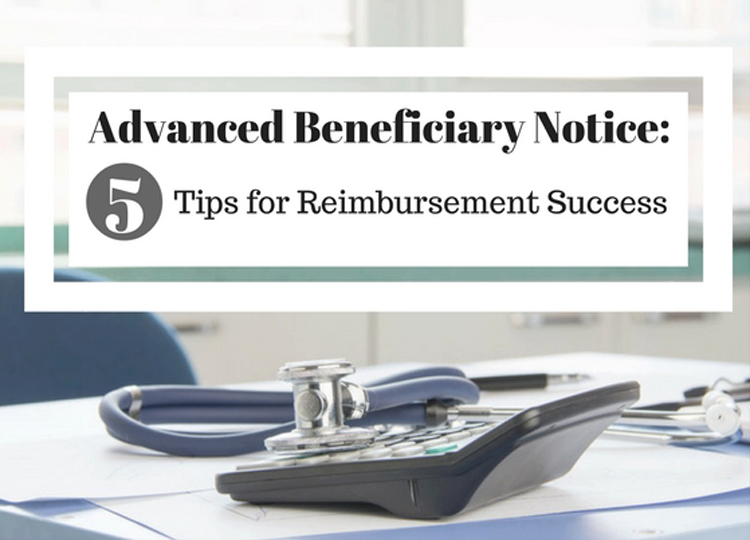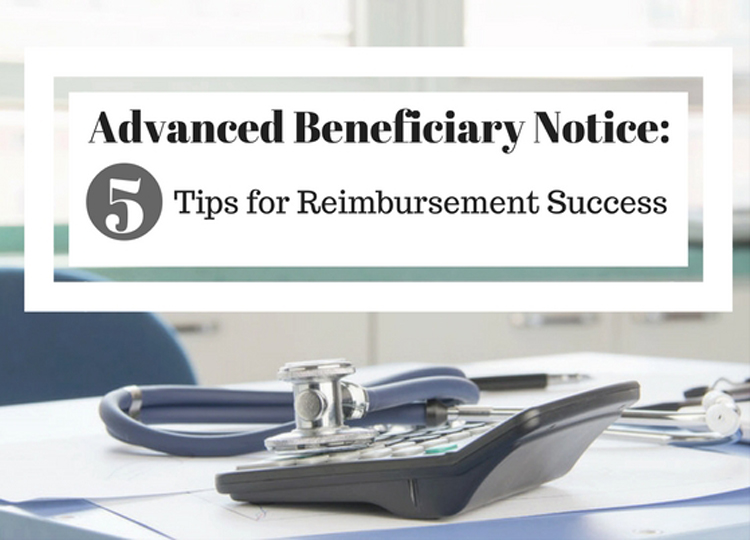

An Advance Beneficiary Notice (ABN) is a waiver of responsibility that is issued to a patient to make sure you receive payment for services and items that are usually covered by Medicare but are not expected to be covered on this occasion. When completed properly, you should be able to recover the cost of the service or item from the beneficiary yourself. The following five key points will help your medical practice take the necessary steps to increase reimbursement success rates so that you are not left out of pocket.
1. Make sure your practice team understands the procedure
There may be a need for training or a team meeting at your practice so that everyone understands the process. Often, Medicare will not provide coverage because there is not documented medical necessity, or because the financial limit for the amount of services permitted for a diagnosis has been reached. Make sure everyone knows where to find the resources below.
2. Be familiar with CMS resources
The ABN is a waiver of liability and it is called CMS-R-131. The complete manual is available from Centers for Medicare and Medicaid Services. You can view it using this link:
https://www.cms.gov/Outreach-and-Education/Medicare-Learning-Network-MLN/MLNProducts/downloads/ABN_Booklet_ICN006266.pdf
You can check the specific criteria and download the form on The Centers for Medicare and Medicaid Services website (CMS.gov) You can use this link: https://www.cms.gov/Medicare/Medicare-General-Information/BNI/index.html?redirect=/BNI/02_ABN.asp
Free educational materials are available here: https://www.cms.gov/Outreach-and-Education/Medicare-Learning-Network-MLN/MLNGenInfo/index.html?redirect=/MLNGenInfo/
3. Explain in advance to your patient why an ABN is required
You must provide your patient with an ABN before the service or item is provided. It cannot be given to a patient who needs emergency treatment or is under duress. Explain to your patient that by completing and signing an ABN, they are acknowledging that certain procedures or items have been provided and that they accept financial responsibility for them.
4. Make sure your patient understands the terms of the ABN and completes and signs it properly.
Explain the process step by step. Let them know that if they choose, they can complete section G and ask Medicare to be billed for an official decision on payment. However, if Medicare does not pay, they agree to be responsible for the payment (subject to appeal). Modifiers are used when submitting charges to Medicare; help your staff understand what is involved.
5. Implement record keeping and procedure review
If you do not issue an ABN where it is required, if it is invalid, or if there is no signed ABN, you cannot bill the patient and the bill must be written off if it is denied by Medicare.
Having procedures in place and adequate record keeping is essential. If your practice is experiencing problems with in-house billing or following up claims, bills are not being issued correctly or on time, or you are experiencing issues with cash flow, consider using an outside company that takes care of your medical billing for you.
Be sure that you get paid for the services you provide – every time!
References:
https://www.cms.gov/Outreach-and-Education/Medicare-Learning-Network-MLN/MLNProducts/downloads/ABN_Booklet_ICN006266.pdf
https://www.cms.gov/Medicare/Medicare-General-Information/BNI/index.html?redirect=/BNI/02_ABN.asp
So is your practice having Medicare patients sign ABNs? Leave me a comment below.
— This post Medicare Advance Beneficiary Notice: 5 Tips for Reimbursement Success was written by Manny Oliverez and first appeared on Capture Billing. Capture Billing is a medical billing company helping medical practices get their insurance claims paid faster, easier and with less stress allowing doctors to focus on their patients.
Capture Billing







